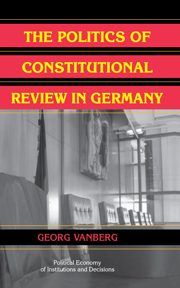Book contents
- Frontmatter
- Contents
- Acknowledgments
- Titles in the series
- 1 The Politics of Constitutional Review
- 2 Implementation, Public Support, and Transparency
- 3 The Federal Constitutional Court in Comparative Perspective
- 4 Transparency and Judicial Deference
- 5 From the Inside Looking out: Judicial and Legislative Perceptions
- 6 Pushing the Limits: Party Finance Legislation and the Bundesverfassungsgericht
- 7 Prudent Jurists
- Bibliography
- Index
1 - The Politics of Constitutional Review
Published online by Cambridge University Press: 11 July 2009
- Frontmatter
- Contents
- Acknowledgments
- Titles in the series
- 1 The Politics of Constitutional Review
- 2 Implementation, Public Support, and Transparency
- 3 The Federal Constitutional Court in Comparative Perspective
- 4 Transparency and Judicial Deference
- 5 From the Inside Looking out: Judicial and Legislative Perceptions
- 6 Pushing the Limits: Party Finance Legislation and the Bundesverfassungsgericht
- 7 Prudent Jurists
- Bibliography
- Index
Summary
Constitutional review – defined as the power of judicial bodies to set aside ordinary legislative or administrative acts if judges conclude that they conflict with the constitution – has emerged as an almost universal feature of Western-style democracy. The commitment to this institution has become so pervasive that it is now virtually unthinkable to draft a democratic constitution without providing for its inclusion. Whether in postfascist Spain, postapartheid South Africa, or postcommunist Eastern Europe, recent transitions to democracy have been transitions to constitutional democracy, including judicial oversight of the political process. As Mauro Cappelletti has observed, in much of the Western world, constitutional review has come to be understood as “the necessary ‘crowning’ of the rule of law” (1989:205).
The experiences of totalitarianism provided a natural impetus for this development. In writing his monumental survey of American democracy in the 1830s, Alexis de Tocqueville praised the role of the judiciary in the new political system, arguing that “the power granted to American courts to pronounce on the constitutionality of laws is yet one of the most powerful barriers ever erected against the tyranny of political assemblies” (1835/1988:103f.). Similarly, constitution writers following World War II, and again in the wake of the peaceful revolutions of 1989 in Eastern Europe, turned to courts armed with the power of constitutional review in the hope of creating effective limitations on the power of legislative majorities.
- Type
- Chapter
- Information
- The Politics of Constitutional Review in Germany , pp. 1 - 18Publisher: Cambridge University PressPrint publication year: 2004
- 28
- Cited by



